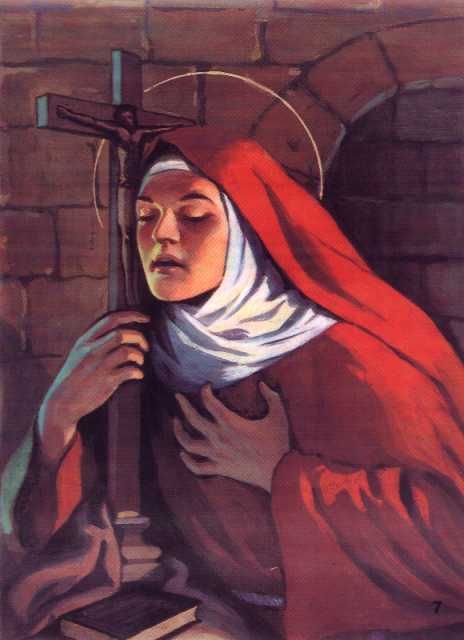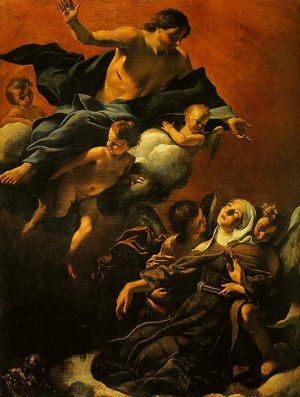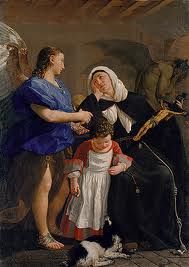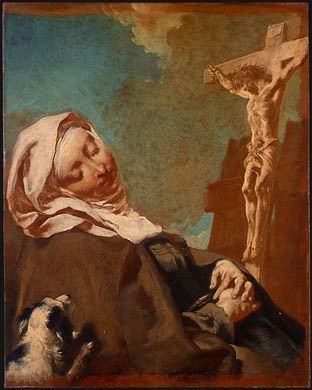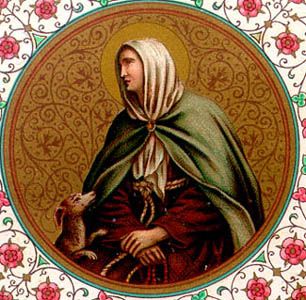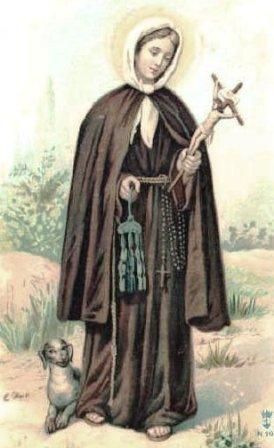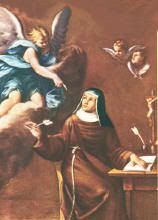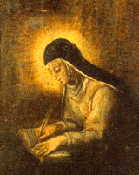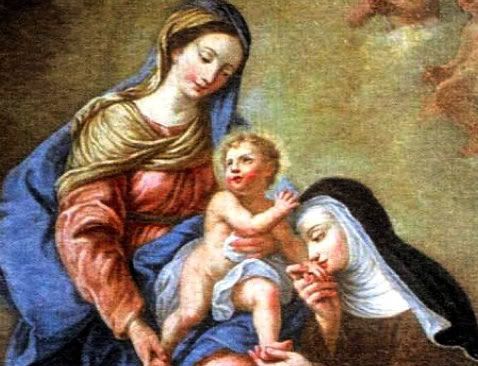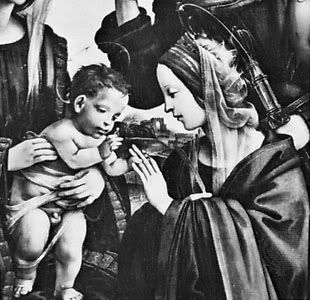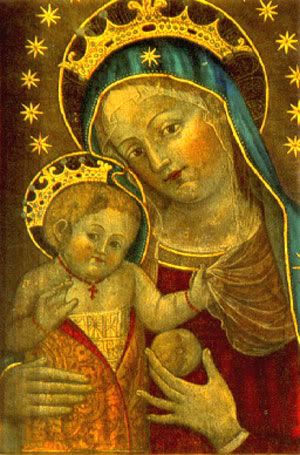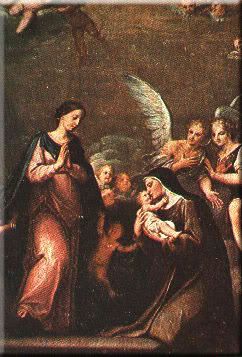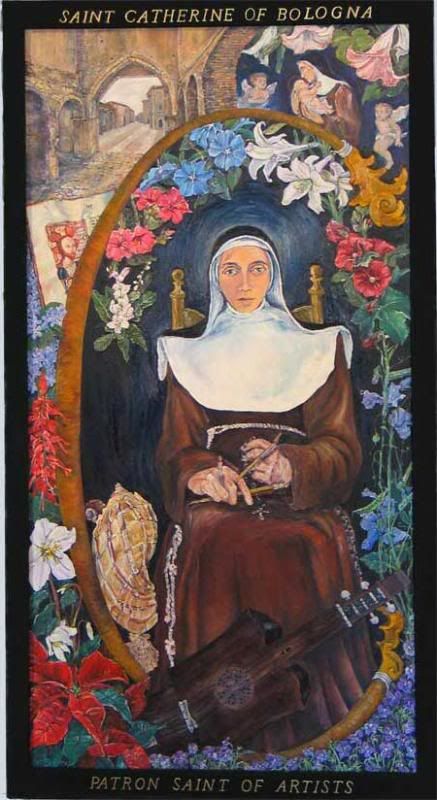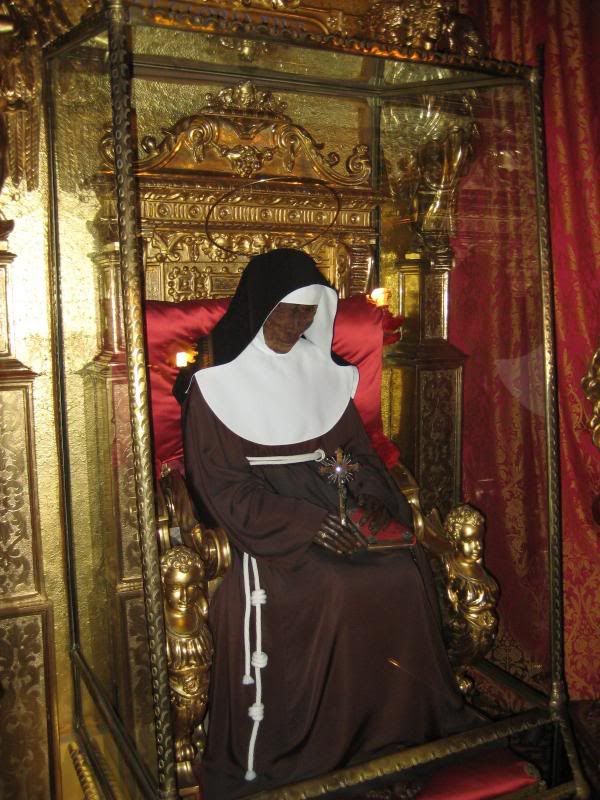St. Clare is the little plant of St. Francis, as she called herself. A blog to my call to become a Poor Clare Colettine. If St. Clare was a "little plant", I am a scraggly weed.
Search This Blog
Saturday, May 18, 2013
Tomorrow is Pentecost, Pray for the Seven Gifts of the Holy Spirit
The Seven Gifts of the Holy Spirit
by Rev. William G. MostWe turn now to the Seven Gifts of the sanctifying category. They are: wisdom, understanding, knowledge, counsel, fortitude, piety and fear of the Lord.
They each perfect certain basic virtues. Four of them perfect the intellectual virtues. Understanding gives an intuitive penetration into truth. Wisdom perfects charity, in order to judge divine things. Knowledge perfects the virtue of hope. The gift of counsel perfects prudence.
The other three gifts perfect virtues of the will and appetites. The gift of piety perfects justice in giving to others that which is their due. This is especially true of giving God what is His due. Fortitude perfects the virtue of fortitude, in facing dangers. Fear of the Lord perfects temperance in controlling disordered appetites.
To illustrate the difference between things done with the Gifts and those done with the ordinary virtues, we will take up the gift of counsel.
There are three kinds of guides a person may follow in making his decisions:
1) The whim of the moment. Aristotle in his Ethics 1. 5 says that to act that way is a life fit for cattle, who do just what they happen to feel like doing.
2) Reason, which in practice is always aided by actual graces, which God gives so generously. For example suppose I see three options open to me, all of which are moral. Ideally I would make at least mentally a list of the good points and of the bad points of each. The I would look over the whole board, and pick what gives the best effect for me. Or if I come to think I need penance for my sins, I would ask: How much have I sinned, so I can know how much penance? what kind of penance will fit with my health? with the obligations of my state in life? And after several steps, a decision is reached. This method is called discursive, since it moves from one step to another.
3) In the third and highest way a soul does not go from one step to another, in a discursive process, but the answer is, as it were, dropped fully made and complete into his mind by the Gifts. This was the case of Our Lady, for example at the annunciation. If she had been operating in the ordinary mode, she might well have reasoned: Now my people have been waiting for centuries for the Messiah (as soon as Gabriel said He would reign over the house of Jacob forever, even any ordinary Jew would have known that He was the messiah). Now he is here. I should share this news with others, especially the authorities in Jerusalem. And what about my husband Joseph? In a short time he will not be able to avoid dark thoughts. But the Gospel shows she did none of these things. God needed to send a special angel to tell Joseph. so the Gifts can lead souls to points not contrary to reason, but far more lofty than what reason would suggest.
Cf. the following from St. John of the Cross: (Ascent 3.2.10; cf. Living Flame 1.4; 1.9 and 2.34): "God alone moves the powers of these souls . . . to those deeds which are suitable, according to the will and plan of God, and they cannot be moved to others. . . . Such were the actions of the most glorious Virgin, our Lady, who, being elevated from the beginning [of her life] to this lofty state, had never the form of any creature impressed on her, nor was moved by such, but was always moved by the Holy Spirit."
But there is a danger: a soul could mistake its own desires for action of the Gifts, since the reasons are not clear to it. Two points must be kept in mind: 1) The full and apparent action of these gifts does not appear until one is well advanced in the spiritual life (hidden assistance by them can come earlier). 2) Ordinarily an inspiration via the Gifts leaves the soul not fully certain--a signal to consult a director or superior. Uncommonly they will give certitude, but only when a decision must be made on the spot, and there is no time to consult.
When a soul acts with usual actual graces God is the most important actor, yet the faculties of the human do churn out the result--hence it is easy to suppose the work is done basically by that soul. But under the action of the Gifts, the soul is more passive, and its own faculties contribute even less.
St. Pope Leo the Great's Sermon on Pentecost
Sermon LXXV: On Pentecost I
By Pope St. Leo I (AD 390-461)
As therefore we abhor the Arians, who maintain a difference between the Father and the Son, so also we abhor the Macedonians, who, although they ascribe equality to the Father and the Son, yet think the Holy Ghost to be of a lower nature, not considering that they thus fall into that blasphemy, which is not to be forgiven either in the present age or in the judgment to come, as the Lord says: "whosoever shall have spoken a word against the Son of Man, it shall be forgiven him, but he that shall have spoken against the Holy Ghost, it shall not be forgiven him either in this age or in the age to come." And so to persist in this impiety is unpardonable, because it cuts him off from Him, by Whom he could confess: nor will he ever attain to healing pardon, who has no Advocate to plead for him. For from Him comes the invocation of the Father, from Him come the tears of penitents, from Him come the groans of suppliants, and "no one can call Jesus the Lord save in the Holy Ghost," Whose Omnipotence as equal and Whose Godhead as one, with the Father and the Son, the Apostle most clearly proclaims, saying, "there are divisions of graces but the same Spirit; and the divisions of ministrations but the same Lord; and there are divisions of operations but the same God, Who worketh all things in all."
V. The Spirit's Work is Still Continued in The Church
By these and other numberless proofs, dearly-beloved, with which the authority of the Divine utterances is ablaze, let us with one mind be incited to pay reverence to Whitsuntide, exulting in honour of the Holy Ghost, through Whom the whole catholic Church is sanctified, and every rational soul quickened; Who is the Inspirer of the Faith, the Teacher of Knowledge, the Fount of Love, the Seal of Chastity, and the Cause of all Power. Let the minds of the faithful rejoice, that throughout the world One God, Father, Son, and Holy Ghost, is praised by the confession of all tongues, and that that sign of His Presence, which appeared in the likeness of fire, is still perpetuated in His work and gift. For the Spirit of Truth Himself makes the house of His glory shine with the brightness of His light, and will have nothing dark nor lukewarm in His temple. And it is through His aid and teaching also that the purification of fasts and alms has been established among us. For this venerable day is followed by a most wholesome practice, which all the saints have ever found most profitable to them, and to the diligent observance of which we exhort you with a shepherd's care, to the end that if any blemish has been contracted in the days just passed through heedless negligence, it may be atoned for by the discipline of fasting and corrected by pious devotion. On Wednesday and Friday, therefore, let us fast, and on Saturday for this very purpose keep vigil with accustomed devotion, through Jesus Christ our Lord, Who with the Father and the Holy Ghost lives and reigns for ever and ever. Amen.
This sermon was delivered on the Feast of Pentecost. Pentecost is the celebration of the descent of the Holy Spirit upon the Apostles in the Book of Acts. It is the birthday of the Church. Translation of sermon from Nicene and Post Nicene Fathers, Second Series: Vol. XII.
"I Have Come to Set the Earth on Fire"
“I have come to set the earth on fire, and how I wish it were already blazing!” When words like fire, water, dirt, etc… are used in Sacred Scripture, there is always a deeper meaning behind them. What does Jesus mean by setting the earth on fire?
Fire can do many things. Fire can destroy. Fire can heat up elements. When we get near a scorching fire, we immediately feel its effects. We end up backing away, unless you are curious like a child.
Fire also has the capacity to purify. When a piece if iron is put into a burning furnace, the iron is heated up to a point where it can be molded and shaped. Without the fire, the iron remains cold and immovable.
And it is the same with us. Apply this analogy to how the Holy Spirit works in our lives. When we allow the Holy Spirit to take possession of our hearts, there are many imperfections that need to be purified. Countless times in Sacred Scripture the image of fire is used as purification. Purification from what?… The imperfections of our lives… Our sins, our weaknesses… The life of God within us and our own sinfulness cannot co-exist. One has to go… and hopefully by our cooperation and the action of the Holy Spirit in our lives, the purifying fire of the Spirit takes reign over our hearts.
The LORD desires that our hearts be on fire. In the Old Testament, the Scribes and Pharisees observed the Law, but without the love of God in their hearts. God the Son became flesh in order to show us the perfection of charity. A Pharisee asked Jesus, “Teacher, which is the great commandment in the Law?” And he said to him, “You shall love the Lord your God with all your heart and with all your soul and with all your mind. This is the great and first commandment. And a second is like it: You shall love your neighbor as yourself. On these two commandments depend all the Law and the Prophets.” Jesus Christ did not merely talk and teach about the great commandment of love of God and neighbor, but He gave us the supreme example and model for how to love.
What image do you think of in the Old Testament associated with fire? Maybe the LORD appearing to Moses in the form of a burning bush… a burning bush that was not consumed. If you would set a bush on fire, I guarantee that it would be consumed very quickly! The unconsumed burning bush teaches us about the fire of God’s Love. Christ came to reveal the His Father’s Love and to send the Holy Spirit among us to set our hearts on fire. The unconsumed burning bush points to what God desires to do in each of our hearts.
Throughout his Pontificate, Pope Benedict has used the imagery and expression that every Christian is called to have a personal Pentecost. The same Holy Spirit that descended upon the Apostles and the Blessed Virgin Mary in the Upper Room is the same Holy Spirit that we receive at Baptism… is strengthened at our Confirmation and is increased within us at every reception of Holy Communion.
Saying that we are called to experience a “personal Pentecost” personalizes to each one of us an event that happened 2000 years ago. God desires that your heart be set on fire with His Love… ultimately that you love as He loves. The Holy Spirit dwelling within us makes this possible.
The Year of Faith, which was inaugurated on Oct. 11th is an opportunity for each of us to do what the Pope is asking: to rediscover the precious gift of Faith—and in some cases to even discover for the first time the Faith that has been given as a pure gift. The Pope is inviting us to study the content of our Faith. It is not merely enough to be Catholic by name. We have to know what we believe and why we believe it. No more Cafeteria Catholism! The Cafeteria is now closed! If we do not know what we believe, how do we expect to fall in love with God? WE CANNOT LOVE WHAT WE DO NOT KNOW… If we do not know God, we cannot love Him. By studying and praying over what we believe as Catholic Christians, we will come to a greater knowledge of the God who has revealed Himself… and in turn fall more and more in love with the God who has made Himself known.
St. Catherine of Siena once said “if you are what you should be, you would set the whole world on fire.” If we would only let God accomplish what he desires to do through us. Bl. Mother Teresa of Calcutta once was asked by a reporter: “Mother, what do you see as the greatest obstacle to your work and furthering the work of the Missionaries of Charity?” She was quick to answer—“ME!” I am the greatest obstacle to God working through me. How true that statement is! We are our biggest obstacle in our life of Faith.—Not other people—or the events or circumstances in the world around us… BUT it is myself… that is preventing the Holy Spirit from working in and through me.
If only we would stop being an obstacle to God. If only we would get out of the way and let Him ignite our hearts with the fire of His Love. What good could be accomplished in the world if every Christian would pray for their own personal Pentecost.
Prayer:
Come Holy Spirit, fill the hearts of your faithful anPrayer:d kindle in them the fire of your love. Send forth your Spirit and they shall be created. And You shall renew the face of the earth.
O, God, who by the light of the Holy Spirit, did instruct the hearts of the faithful, grant that by the same Spirit we may be truly wise and ever enjoy His consolations, Through Christ Our Lord, Amen.
By Br. John Paul Mary
(Franciscan brother of the Franicscan Missionaries of the Eternal Word - founded by Mother Angelica, at EWTN)
Belated - Feast of St. Margaret of Cortona, May 16th
May 16th the Poor Clare Colettines and Franciscans celebrate the feast day of Saint Margaret of Cortona
(1247-1297), a model of Christian redemption and conversion. Saint
Margaret is sometimes referred to as the Second Mary Magdalene,
recognized for her turn from sin to exemplary holiness. For more on the
life and sainthood of Saint Margaret of Cortona.
Pope John Paul II prayed to Saint Margaret, while on pilgrimage, in 1999. The text of his prayer follows:
O Saint Margaret of Cortona, I too come today as a pilgrim and I pause to pray with you at the feet of the image of Christ Crucified and Risen, whom, as a penitent, you contemplated at length. Lord Jesus, crucified for us, in offering yourself on Calvary for all humanity, you have revealed to us the wellsprings of everlasting life. May the mystery of your Passion enlighten our life making us ready to follow you on the way of holiness and love. Rekindle our faith; teach us to recognize and welcome in our everyday life the plans of your mysterious Providence. Give us the courage to confess our sins and open our hearts to sorrow, in order to receive the gift of your mercy. Empower us to forgive our brethren following the example of your love that knows no bounds. Help us to be humbly disposed to repair the harm we have done by actively and generously serving the poor, the sick, and all who are marginalized and without hope. Give everyone the joy of persevering faithfully, in full harmony with the Church, along the way of the particular calling. Above all others, show the young the splendid plan of love that you intend to bring about for them and with them at the threshold of the new millennium. Enable us to be peacemakers, tenacious weavers of daily relationships of fraternal solidarity, artisans of reconciliation, witnesses and apostles of the civilization of love. O glorious Saint Margaret of Cortona, present this request to your Crucified Lord and ours. Guide us with the strength of your example, support us with your constant protection, be our companion we beg you, till we reach our Father's house. Amen.
Today, we pray to Saint Margaret of Cortona for the grace of conversion, sincere repentance, and the ability to both discern and follow the voice of Jesus. Saint Margaret of Cortona, Pray for us!
O holy Margaret of Cortona, I am here before this image of Jesus crucified which has spoken to you so many times. Obtain for me, too, the grace of hearing His voice: Through His Word, Through prayer, And the events of life.
O Jesus Crucified, increase my faith and grant me, as you granted to holy Margaret, the grace of a sincere repentance from my sins;
make me at one with the most needy
and accompany me, I ask you, to the Father's house. Amen
Pope John Paul II prayed to Saint Margaret, while on pilgrimage, in 1999. The text of his prayer follows:
O Saint Margaret of Cortona, I too come today as a pilgrim and I pause to pray with you at the feet of the image of Christ Crucified and Risen, whom, as a penitent, you contemplated at length. Lord Jesus, crucified for us, in offering yourself on Calvary for all humanity, you have revealed to us the wellsprings of everlasting life. May the mystery of your Passion enlighten our life making us ready to follow you on the way of holiness and love. Rekindle our faith; teach us to recognize and welcome in our everyday life the plans of your mysterious Providence. Give us the courage to confess our sins and open our hearts to sorrow, in order to receive the gift of your mercy. Empower us to forgive our brethren following the example of your love that knows no bounds. Help us to be humbly disposed to repair the harm we have done by actively and generously serving the poor, the sick, and all who are marginalized and without hope. Give everyone the joy of persevering faithfully, in full harmony with the Church, along the way of the particular calling. Above all others, show the young the splendid plan of love that you intend to bring about for them and with them at the threshold of the new millennium. Enable us to be peacemakers, tenacious weavers of daily relationships of fraternal solidarity, artisans of reconciliation, witnesses and apostles of the civilization of love. O glorious Saint Margaret of Cortona, present this request to your Crucified Lord and ours. Guide us with the strength of your example, support us with your constant protection, be our companion we beg you, till we reach our Father's house. Amen.
Today, we pray to Saint Margaret of Cortona for the grace of conversion, sincere repentance, and the ability to both discern and follow the voice of Jesus. Saint Margaret of Cortona, Pray for us!
O holy Margaret of Cortona, I am here before this image of Jesus crucified which has spoken to you so many times. Obtain for me, too, the grace of hearing His voice: Through His Word, Through prayer, And the events of life.
O Jesus Crucified, increase my faith and grant me, as you granted to holy Margaret, the grace of a sincere repentance from my sins;
make me at one with the most needy
and accompany me, I ask you, to the Father's house. Amen
Prayer to St. Margaret of Cortona
| The following prayer was printed in the February 2002 "Santa Margherita da Cortona" booklet sent out by the Basilica. I wrote to them last year, and they started sending me these wonderful Italian newsletters. It has been translated from Italian into English. "O holy Margaret of Cortona, I am here before this image of Jesus crucified which has spoken to you so many times. Obtain for me, too, the grace of hearing His voice: Through His Word, Through prayer, And the events of life. O Jesus Crucified, increase my faith and grant me, as you granted to holy Margaret, the grace of a sincere repentance from my sins; make me at one with the most needy and accompany me, I ask you, to the Father's house. Amen." | |||||||||||||||||||||||||||||||
PRAYER TO ST MARGARET OF CORTONA FOR ANY NEED
| |||||||||||||||||||||||||||||||
Belated - Feast of St. Catherine of Bolgona, May 9th - Poor Clare nun, Mystic and Miracle Worker
(A belated post on St. Catherine of Bologna, Poor Clare - mystic and miracle worker. The Poor Clare Colettines and Franciscans celebrate her day on May 9th.)
May 9th: Saint Catherine of Bologna
May 9th commemorates the feast day of Saint Catherine of Bologna (1413-1463), virgin of the Church, mystic, and patron saint of artists and those who are tempted. Saint Catherine was born in Bologna, and appointed as the maid of honor to the daughter of the Marquis of Ferrara, for whom her father served as an aide. Catherine moved into the palace, and became best friends with her mistress, Margaret. Upon the engagement of Margaret, who wished Catherine to remain with her, Catherine instead entered the religious life. At age 14, she joined the third order of the Franciscans, who lived a semi-monastic life.
Eventually, the community to which Catherine belonged adopted the second rule of the Franciscans, joining the Order of the Poor Clares. There, Catherine lived in poverty and obedience, joyfully serving the Lord. However, Catherine felt that the rule was not strict enough in the community she served, and eventually was moved to a more austere community, where she reluctantly agreed to be Abbess.
Saint Catherine was graced with many spiritual gifts, beginning early in her religious life, and persisting until the end of her days. A mystic, she frequently experienced visions of the Blessed Mother, Christ at the hour of His crucifixion, and was tormented by visions and temptations of the Devil. All of these she passed along to her sisters, for their spiritual direction, and some she recorded in Latin, having been schooled in Latin at the court of the Marquis.
The most remarkable of her visions occurred on Christmas Eve. She had asked permission, at that time, to spend Christmas Eve alone in the convent chapel, intending to pray one thousand Hail Marys in honor of the Blessed Mother and the Nativity of Our Lord. As she later recounted, at approximately midnight, the dawning of Christmas morning, the Blessed Virgin appeared to Catherine with the swaddled baby Jesus in her arms. The Mother of God handed the Infant to Saint Catherine, who joyously held Him and kissed His cheek. Following that worship, He disappeared, but her heart was left changed forever.
Under the direction of Saint Catherine, the community became known for austerity, service to the poor, and holiness. But Catherine, led by her joyous heart, was also a woman filled with joy, which she passed along to her sisters. They suffered gladly for Christ, eschewing wealth and comfort, but their hearts leapt and danced for joy. Saint Catherine wrote in her book Le sette armi spirituali (The Seven Spiritual Weapons):
Let every lover who loves the Lord
Come to the dance singing of love,
Let her come dancing all afire
Desiring only him who created her
And separated her from the dangerous worldly state."
Saint Catherine is also known as a talented artist and musician, her love and joy in the Lord spilling forth in whatever artistic medium she chose. (See picture of Mary and Jesus, Mother and Child, left, painted by Saint Catherine).
Saint Catherine strove to live a life of perfection. She instructed her community in the ways of holiness, including penance and suffering. In preparation for loving Christ, Catherine enumerated seven spiritual weapons of use to the faithful:
“Whoever from deep within her noble and zealous heart wished to take up the cross..., let her first take up the arms necessary for such battles...: first is diligence; second, distrust of self; third, confidence in God; fourth, memory of his passion; fifth, memory of one's own death; sixth, memory of the glory of God; seventh and last, the authority of Holy Scripture as it gives the example of Christ Jesus in the desert.”
While she was frail throughout her days, Catherine lived a relatively healthy life until shortly before her death due to a terminal illness. Upon her deathbed, her sisters observed that her aged face had been restored to the smooth youth of her teen years when she had entered the order. Buried without a coffin, her body was exhumed 18 days later, due to the overpowering sweet fragrance emanating from the gravesite. Found incorrupt, Saint Catherine was seated in a golden throne, in the small chapel of Cheisa della Santa, where she remains today. Her incorrupt body and face appear smooth and featureless, although somewhat blackened by the soot of 500 years of burning candles.
Saint Catherine’s search for perfection, her faith, and her piety are worthy of aspiring to. But more than that, the joy that Saint Catherine found, even in her suffering and death, is remarkable. She was confident in the love of Christ, confident that He would never stop caring for her, confident in His grace and mercy. During Lent, we often feel as if we should be morose and gloomy, fasting, abstaining, and enacting other mild forms of mortification and penance. Saint Catherine understood these physical acts of repentence as well, but did so with a joyful heart, dancing and singing of the love of the Lord. This Lent, perhaps it is our turn to join in this glorious dance, hearts afire, desiring only Him who created us!
Photo below, photos of St. Catherine's uncorrupted body.
(The above from: http://365rosaries.blogspot.com/2010/03/march-9-saint-catherine-of-bologna.html)
Prayer to St. Catherine of Bologna
Dear saintly Poor Clare, so rich in love for Jesus and Mary, you were endowed with greatly talents by God and you left us most inspiring writings and paintings of wondrous beauty. You were chosen Abbess in the monastery of Poor Clares at Bologna. You did all for God's greater glory, and in this you are a model for all. Make artists learn lessons from you, and use their talents to the full.
Amen.
Today is the Feast of St. Felix of Cantalice - Known as "Brother Deo Gratias"
(1515-1587)

He persisted in his desire to become a Capuchin and presented himself at the Capuchin Friary at Cittaducale. The local minister led him into the church, before a large crucifix, asking that he pray to be enlightened. The corpus on the cross was bruised, bloodied, and disfigured. Moved by the sight, Felix experienced the depth of God's love for him. That evening, the local minister (having forgotten about Felix) returned to the chapel to pray. Felix was still there. The local minister remarked, "Son, what are you doing? Still here? You are a good person; we will accept you among us. Jesus will no longer be alone. You will help him carry the cross." Ten days later, toward the end of the autumn of 1543, the 20-year-old Felix was received. He immediately set out for Rome to present himself to the elusive provincial vicar. At the Roman friary of St. Nicholas de Portiis, Felix was received by Bernardine of Asti, who was both the Roman local minister and procurator for the Capuchin Order before the Roman Curia. Bernardine introduced Felix to Raphael of Volterra, the Capuchin Provincial Vicar of the Roman Province, who officially received Felix into the Order.
On a rainy morning in early 1544, Felix set out for the Fiuggi friary where the provincial vicar had determined his year of novitiate would be spent under the guidance of Boniface. During the harsh days of novitiate, Felix suffered debilitating fevers. The friars were considering asking him to return to secular life. As a last resort, they transferred Felix to Monte San Giovanni Campano where Felix recovered. Before the public notary, James of Mastrantonio, Felix relinquished his worldly possessions to his siblings and waived all claim to any future inheritance. He professed vows on May 18, 1545.
Lover of nature that he was, the rustic Felix had become a Capuchin hoping to be able to live the rest of his days in one of the many friaries located in secluded forests. In reality, only the first few years of his religious life were spent in such locations at Fiuggi, Monte San Giovanni, Tivoli, and Viterbo. Then, in 1547, Felix was introduced to the frenzied life of Rome. In his younger years, in imitation of the desert ascetics, Felix had vowed never again to touch bread. Ironically, his Roman assignment was to quest for bread and wine. Despite his desire for seclusion, Felix' ministry placed him in direct, daily contact with a multitude of people. Following then current Capuchin custom, Felix always made his quest barefoot, with eyes cast down. His response to every benefactor was always a humble yet confident "Thank God" ("Deo gratias"). So often was it repeated that Felix became known as "Brother Deo Gratias." Not only did Felix provide the friars with food, but he also furnished food for the hungry. He received permission from the ministers to help the needy, especially widows with many children. It is said that his begging sack was as bottomless as his heart. He never refused a request for help. Felix would dispense oil, bread, wine, and meat. When he could not provide the required aid himself, he would solicit the help of the wealthy, including church dignitaries. Felix always reminded people, benefactors and beneficiaries alike, of divine providence and urged them to give thanks to God. He would visit the sick at the friary, in private homes, at the hospitals of St. James of the Incurables, of the Holy Spirit, and of St. John Lateran. Felix spoke in simple language, exhorting the sick to trust, and to accept sickness as a graced moment.
Felix' reputation as a healer of peoples' ills spread. He would often bless the sick with a crucifix and they would be healed. At other times, he would give away some of the alms he had collected, which, in turn, became channels of healing. Felix healed Constance, the mother of the Cardinal Bishop of Orvieto, Peter Crescenzi, by bathing her eyes with wine he had received as an alms. Similarly, at the hospital of St. John, a patient was healed instantaneously after Felix had given him some donated wine. Friends began to tease Felix saying, "Brother Felix, when I get sick, bring me a little of your wine!" Felix exhorted everyone in his rustic Sabine dialect, always using the informal form of address. He treated every individual with the greatest respect, whether giving alms or receiving them. Felix was a person who had difficulty saying "no," and benefactors knew this. If someone asked for something, Felix always provided.
His upbringing prevented him from putting on airs. A person's social or ecclesiastical position notwithstanding, Felix would directly (and unceremoniously) confront those in need of conversion. Stories of Felix' life read like incidents out of the Fioreffi. One day, Felix, seeking food for the poor, knocked at the door of a lawyer who was immersed in reading a legal treatise. The lawyer, indignant over the intrusion, made it known that he was involved in something far more important than any trivial affair in which the brother was involved. Felix's eyes filled with tears and he asked, "Is there perhaps some law more important than God's?" The lawyer soon abandoned his law career to pursue a life of ministry in the church. On another occasion, Felix confronted the illustrious lawyer, Bernardine Biscia, by placing a crucifix on top of some legal tomes Biscia was perusing. Felix pointed to the Crucified One and said, "Look, Sir Bernardine, all these books were made for you to better understand him."
Felix normally spoke little outside the friary. Even within the friary, what he had to say was more often than not an exhortation for others to give good example. His style was frank and direct. He might tell someone, "I want to correct you." He often reminded Capuchin preachers, "Preach in order to convert people, not to make a name for yourself." At times, he would quote Brother Giles' quip: "Bo, bo, bo, assai dico e poco fo!" ("Tsk, tsk, tsk, a lot of talk, but no action.") To Cardinal Julius Anthony Santori, the Capuchin cardinal protector, Felix once said: "My lord cardinal, you were designated to protect us, not to interfere with matters that pertain to the superiors of the Order." He advised the future Sixtus V, "When you become pope, be pope for the glory of God and the good of the church. Otherwise, it would be better for you to remain a simple friar." The same pope would occasionally encounter Felix questing and would ask for a piece of bread. One day, Felix gave him a piece of stale black bread and remarked to the Franciscan pope, "Excuse me, Holy Father, but you're still a friar."
For his personal devotion and meditation, Felix memorized prayers and liturgical and biblical texts. Despite being illiterate, Felix prayed from the heart and occupied his mind with spiritual reflections. Whether he was walking the streets of Rome, in his cell or in chapel, he was absorbed in contemplation. He would recall the words of the gospel for inspiration. After everyone else had gone to bed, Felix would spend long hours before the Blessed Sacrament entrusting to God's care the people he had met in the course of the day.
He had a curiosity about subjects of which he had no formal education. Often he would seek counsel from the famous Spanish priest, Alphonse Lupo. Felix was a personal friend of Philip Neri and an acquaintance of Charles Borromeo. Felix recognized that authentic holiness was both enlightened and enlightening. Thus, by seeking the advice of knowledgeable people, the "saint of the streets of Rome" was enabled in turn to advise or admonish the people who sought counsel from him.
Felix was an institution for two generations of Roman youth. Youngsters would affectionately call him "Papa," causing some raised eyebrows among those who were unfamiliar with the esteem in which the Capuchin was held. People brought their cares immediately to Felix for help. Even before going to the doctor, they would call on Felix. He would go to their side, kneel, and say an "Our Father" and a "Hail Mary," and then return to the friary confident that providence would take care of the rest. At other times, Felix would exhort the sick to acceptance, saying, "Heaven, heaven," or, "Allow yourself to go to paradise." Felix had an intense fondness for mothers and babies. He would always take a moment to dedicate the infants and to teach the young to repeat, "Jesus, Jesus," or, "Deo gratias." Felix had a talent for spontaneously creating and singing spiritual hymns. People would often ask him to sing. His devotion to the Virgin Mary was not apparent, except in these free verse songs and from the testimony of Alphonse Lupo who knew Felix well. Felix carried out his ministry until just days before his death. Cardinal Santori had offered to use his influence to have the elderly Felix relieved of the difficult task of questing, but Felix refused.
On April 30, 1587, Felix fell ill. He knew he was about to die. To the friars he remarked, "This little ass has dropped; it will not rise again." With Urban of Prato at his bedside, Felix raised his hands and his face became resplendent. Urban asked him what was happening and Felix responded, "I see the Virgin Mary surrounded by a throng of angels." As the local minister was bringing Eucharist as Viaticum, Felix began to sing, "O Sacrum Convivium." He died on May 18, 1587. Felix' remains are enshrined in the Capuchin church of the Immaculate Conception on Rome's exclusive via Veneto.
Sixtus V was determined to proceed to canonization, by Roman acclamation if necessary, but the process was not concluded. After Sixtus V died, the momentum of the process dissipated. Finally, on October 1, 1625, Urban VIII beatified Felix and Clement XI canonized him on May 22, 1712, the first Capuchin to be so honored.
Homily from the mass on St. Felix by the Franciscan Friars:
Subscribe to:
Posts (Atom)








